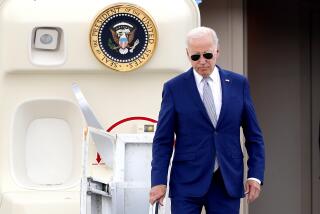Challenge for Clinton: Asia Just Will Not Wait : New President’s economic foreign policy will be sorely tested
- Share via
Perhaps nowhere in the world has the changing of the guard at the White House resonated more than in Asia. The Clinton Administration is being closely watched from across the Pacific for clues, direction and reassurance from the new President’s foreign policy team.
Will President Clinton attempt new policy initiatives in Asia? Probably not soon. With pressing foreign policy issues in Bosnia, Iraq and Russia, Clinton is likely to continue, for now, the line of the previous Administration. But changing dynamics in Asia will demand thorough re-examination of U.S. policies toward Japan, China and South and Southeast Asia. Asia won’t wait.
President Clinton may be the first post-Cold War President, but he still confronts remnants of the Cold War matrix in Asia, where communist regimes remain in power in China, North Korea, Vietnam and Laos. Even so, Clinton is likely to find himself obsessed not with his predecessors’ fear of communism but with a fear of growing trade deficits.
Secretary of State Warren Christopher has described the core of the Clinton foreign policy by saying, “The strength of our economy is in the foundation of our foreign policy.” Along those lines, a sketchy three-prong approach is emerging in Clinton’s Asia policy: trade; continued U.S. troop withdrawals and more sharing of the military burden; human rights.
CHINA: In campaigning for President, Clinton accused the Bush Administration of “coddling China” after the Tian An Men Square massacre in 1989. But Clinton also was careful to say he did not want to isolate Beijing. Since the election, Clinton has taken a more moderate line, even crediting Bush for getting the Chinese to cooperate on tough trade issues.
But he did send a message on human rights to Beijing in his appointment of Winston Lord as assistant secretary of state for East Asia. The former ambassador to China was one of the strongest and best-known critics of the Bush Administration’s policy of reconciliation with China.
Of special concern is Beijing’s aggressive sales of advanced weapons and civil nuclear technology to Third World countries. And even though China agreed to limit missile sales, it has been operating on the fringes of what is allowable.
JAPAN: Clinton assumed office just as Japan’s trade surplus with the United States was reported to be up 14%, to $43.67 billion, in 1992. U.S. Trade Representative Mickey Kantor said last week that Japan’s huge surplus will be high on the new Administration’s agenda.
The next public test of the Clinton policy toward Japan could occur at the June meeting of the seven leading industrial countries in Tokyo. The President has been briefed on suggestions for significant shifts in policy. Meanwhile, Japan is striking out on new Asia policy initiatives.
KOREA: Clinton said during the campaign that U.S. troops should remain in South Korea as long as North Korea is a threat. The two Koreas are attempting unification, but Clinton must continue the U.S. opposition to North Korea’s nuclear weapons development.
VIETNAM: Clinton should continue the Bush effort toward normalizing relations with Vietnam; otherwise the United States will stand alone in trying to isolate that nation.
SOUTH ASIA: The continuing bitter dispute over Kashmir remains a flash point between India and Pakistan. Helping keep these two regional powers, which have nuclear arms, at peace is only one of the formidable challenges awaiting Clinton in Asia.
More to Read
Get the L.A. Times Politics newsletter
Deeply reported insights into legislation, politics and policy from Sacramento, Washington and beyond. In your inbox twice per week.
You may occasionally receive promotional content from the Los Angeles Times.









